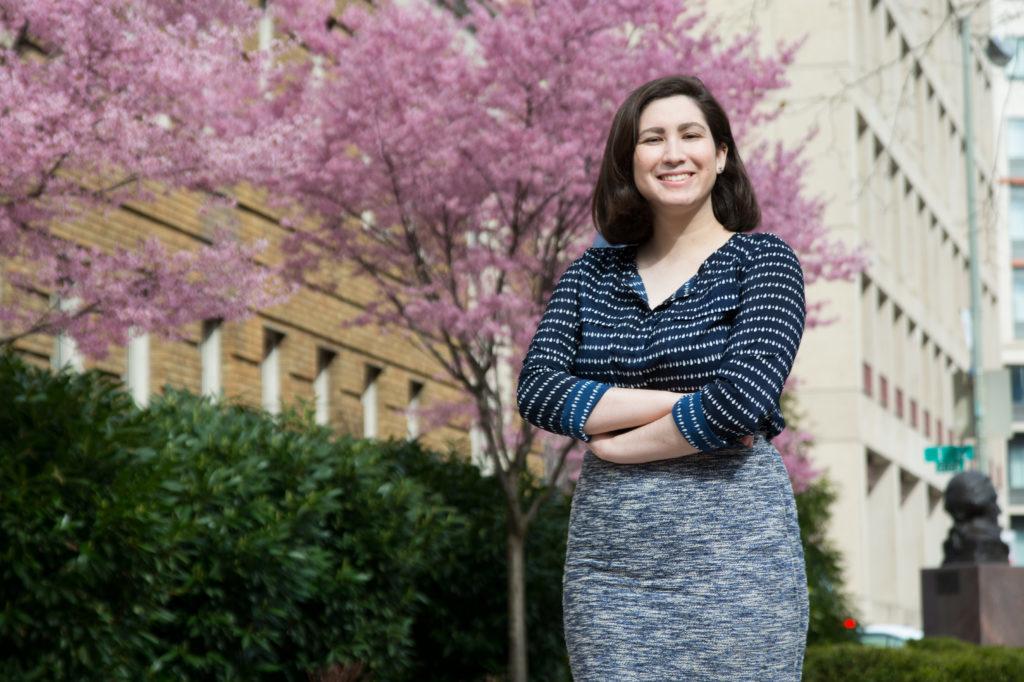Updated: March 2, 2017 at 1:30 a.m.
Lande Watson, the president of the College Democrats and the Student Association vice president for public affairs, is first to announce her candidacy for SA president.
Watson, a junior and California native, launched her campaign Thursday. Out of a platform that includes more than 15 major goals, she said will focus on raising the semester credit cap from 17 to 18 credits, expanding training for peer hotline volunteers and creating SA director positions to work with student groups.
“I hope that we are able to take this opportunity to bring to light a lot of the different ways that the SA and the University can make GW a better community for all students,” she said.
Watson said she has spoken to more than 50 student leaders and administrators, like Anne Graham, the assistant director of student involvement and Greek life, over the past six weeks while developing her platform.
I hope that we are able to take this opportunity to bring to light a lot of the different ways that the SA and the University can make GW a better community for all students.
Watson said her goal of raising the standard credit cap from 17 credits to 18 credits is an affordability measure. Currently, students are charged an additional $1,475 for each credit over 17 credits they complete in a semester, according to the Office of Student Financial Assistance website.
Thirteen of GW’s 14 peer institutions, including Georgetown and New York universities, have credit caps above 17 credits.
“This is a big cost that affects students who struggle to pay to be here,” Watson said. “Students who can afford to do this will shell out the money.”
Watson said she spoke with SA president Erika Feinman and Executive Vice President Thomas Falcigno about the proposal, as well as Elizabeth Amundson, the University registrar. Watson said once she determines how many students take 18 credits a semester – a number tracked by the registrar’s office but not made publicly available – she would meet with more administrators and student group leaders.
“Retention is a huge focus for administrators in the upcoming years. I think anything that can give students more freedom to make a schedule that works for them, and graduate in a timeline that works for them, is something the administration would be receptive to,” she said.
Watson said she also plans to add more targeted volunteer trainings for GW Listens, the University’s first anonymous peer hotline that opened in January after years in development.
She said she has talked to Anastasiya Parvankin, the director of GW Listens, as well as Amber Singh, the vice president of Students Against Sexual Assault, Abeke Teyibo, the president of the Black Student Union, and River Crawford, the education chair of Allied in Pride, to develop issue-specific trainings.
“If you have buy-in from student organizations and student leaders, hopefully it will be seen more as a resource and more people will know about it,” Watson said.
Student leaders will recruit volunteers from their groups and design refined trainings on how to handle callers dealing with issues like racial tension or homophobia, she said. Watson added that she plans for the line to eventually hold hours for students with a specific issue to call-in.
Students who volunteer for the hotline currently take a weekly course run jointly by Mental Health Services, the Colonial Health Center and academic programs, during which they learn how to deal with potential caller scenarios.
Watson said she will create about four “cohort director” positions within the SA that will meet weekly and work with student organization leaders on campus to find solutions to non-financial concerns, such as finding an event venue on campus.
SA senators already represent students from their respective schools and are assigned to help student groups with their financial concerns.
“Right now no one is even talking to student orgs about these problems,” Watson said. “If you have a friend in the SA, you might be able to approach them and bring up an issue. If you don’t, there is no formal process for you to talk to someone in the SA, unless it is about financial issues.”
Watson’s platform includes more than 15 main points, which she said sets her apart from most candidates who focus on a handful of ideas. She said she will reach each goal by delegating projects from the platform to individual cabinet members.
“I think the culture right now is that the president and the EVP have their initiatives and spend the summer and the academic year working on those specific projects,” she said. “I want to make sure I am empowering my cabinet.”
It is important for any leader, but especially in this position, to be able to not only manage a team but also work on their own projects.
The SA president is supported by about 10 vice president positions – specializing in areas like academic and financial affairs – as well as more than 14 director positions in more specific areas, like international students and sustainability. Watson will delegate 17 of her platform projects to 13 directors and vice presidents on her staff who will be confirmed after the election, according to her cabinet breakdown proposal.
She said this style of leadership will help her achieve goals quickly, and that her experience overseeing committees and planning campaign trips as president of CDs has prepared her.
“It is important for any leader, but especially in this position, to be able to not only manage a team but also work on their own projects,” Watson said.





